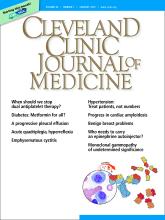ABSTRACT
Patients who have had anaphylaxis or who are at risk of it (eg, due to food allergy or Hymenoptera hypersensitivity) should carry an epinephrine autoinjector at all times. However, the risks and benefits must be considered on an individual basis, especially in patients with athero-sclerotic heart disease, elderly patients on polypharmacy, patients receiving allergen immunotherapy, those with large local reactions to insect stings, and individuals with oral allergy syndrome.
Footnotes
Dr. Song has disclosed membership on advisory committees or review panels for Allergopharma, and teaching and speaking for Novartis and Teva. Dr. Lieberman has disclosed consulting for Kaléo.
- Copyright © 2019 The Cleveland Clinic Foundation. All Rights Reserved.
- T. Ted Song, DO, FAAAI, FACP⇑
- Clinical Associate Professor of Medicine, Department of Medicine, Division of Allergy and Infectious Diseases, University of Washington, Seattle
- ADDRESS:
T. Ted Song, DO, Department of Medicine, Division of Allergy and Infectious Diseases, University of Washington, 1203 Bridgeport Way SW, Lakewood, WA 98499; tsong{at}allergyasthmass.com
- Phil Lieberman, MD
ABSTRACT
Patients who have had anaphylaxis or who are at risk of it (eg, due to food allergy or Hymenoptera hypersensitivity) should carry an epinephrine autoinjector at all times. However, the risks and benefits must be considered on an individual basis, especially in patients with athero-sclerotic heart disease, elderly patients on polypharmacy, patients receiving allergen immunotherapy, those with large local reactions to insect stings, and individuals with oral allergy syndrome.
Footnotes
Dr. Song has disclosed membership on advisory committees or review panels for Allergopharma, and teaching and speaking for Novartis and Teva. Dr. Lieberman has disclosed consulting for Kaléo.
- Copyright © 2019 The Cleveland Clinic Foundation. All Rights Reserved.






